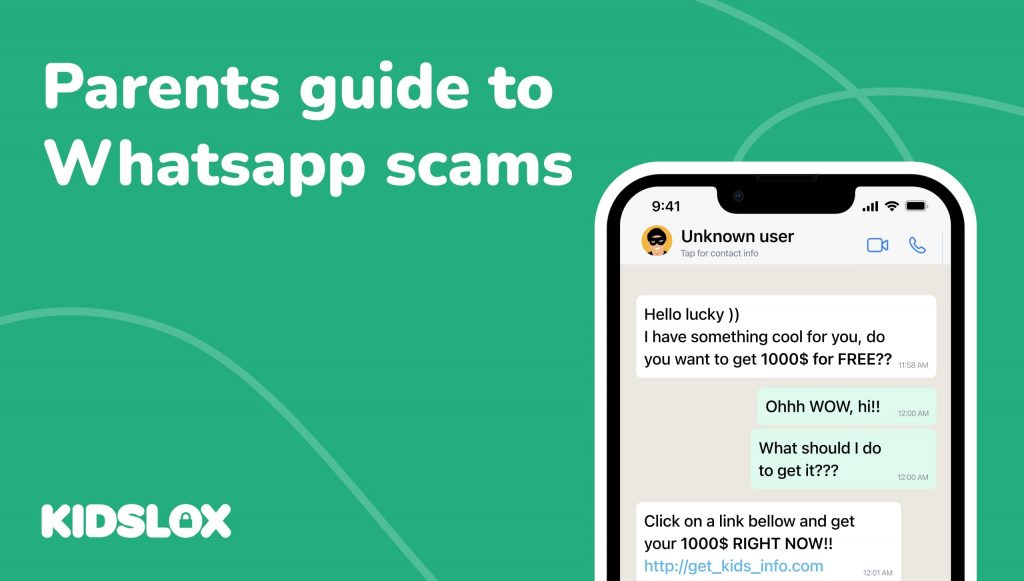As our lives become more and more digitized, unfortunately so do the ways in which scammers, fraudsters and other criminals seek to exploit us.
The popular messaging platform, WhatsApp, is one of the fastest growing communications platforms in the world. Simple, easy to use and inbuilt with video and audio call features, it’s a great way to keep in touch with family and friends. Other benefits of the app include the ability to share pictures and videos and create groups. Groups can be a really great way to keep in touch with other parents and on top of school commitments too.
As WhatsApp is part of daily life for a lot of people, that makes it hot property for scammers.
In the last year, it is estimated that US citizens lost $770 million to social media scams and the number shows no sign of slowing.
If you and your family use WhatsApp, it’s well worth taking note of some of the most common scams out there, to protect yourself and your loved ones from falling for the bait.
Here’s our guide to recognizing and protecting yourself from WhatsApp scams.
What is a WhatsApp scam?
WhatsApp is end-to-end encrypted, which makes it challenging for hackers to access it and read your conversations. Instead, scammers seek to find out your personal information or to trick you into giving them access to other accounts, including your email and banking details.
How to spot a WhatsApp scam
Scammers using WhatsApp are getting increasingly sophisticated, which makes it harder to spot legitimate messages from harmful ones. As most WhatsApp scammers are in it for the financial gain, there are some common behaviors you can look out for.
1. A sense of urgency
One of the surefire ways that WhatsApp scammers seek to get you to share personal information is by creating a sense of urgency. They want you to panic. When you’re in this frame of mind it’s more challenging to stay rational, and easier for them to coerce you into doing something you wouldn’t typically do, so beware of this tactic when you feel like something suspicious is going on.
2. Needing money or immediate help
Asking for money to get out of a situation, or to avoid something unpleasant is another trick the WhatsApper scammers use. For example, they might tell you that you need to pay a bill very quickly, or click on a link to update your payment details to avoid a big fine or fee. Don’t panic. Check the account in question using a different device or computer and talk to the brand or business directly to confirm any discrepancies before paying a cent.
3. The tone is off
Scammers are becoming more cunning, but quite often there will be something ‘not quite right’ about their tone or what they’re asking. Always check in with the person they’re purporting to be and if something doesn’t sound right, take it as a red flag.
4. Sending links
Always be wary of links, even if they come from someone you know. It’s all too easy for scammers to send round malware or other malicious links through WhatsApp, all with the intention of obtaining your precious data under false pretenses.
5. Keywords to watch out for
There are patterns with WhatsApp scammers, and the same old words and phrases are one of the things to look out for. Popular scamming words include, voucher, win, activate, congratulations, winner, deal.
6. Forwarded messages
If the link comes in the form of a forwarded message, be wary. These links can be viral scam messages doing the rounds of multiple victims.
7. Competitions and offers that seem ‘too good to be true’
Anything that seems too good to be true usually is. Use your common sense and don’t fall victim to things that are relatively high value for low effort – it’s usually a scam.
How to spot a scammer! The most common WhatsApp scams and how to protect yourself from them.
Family impersonation WhatsApp scams
WhatsApp scammers have no problems when it comes to tugging on the heartstrings. A common scam they might use to get you to divuldge personal information or hand over cash is to impersonate a family member, and pretend to be in danger or need of urgent help.
Often the scammer will send a message from an unknown number along the lines of; ‘Hey mum, I have a new number as I lost my phone. Delete my old one and add this instead ????.’ It;s a plausible message if you have older kids living away from phone.
Once they have assumed the identity of a loved one, they may go on to ask for personal information or even money transfers.
How to protect yourself against this type of WhatsApp scam?
Always call the loved one to double check it is indeed them that has got in touch with you. Never send money to accounts you don’t recognise.
Kidnapping WhatsApp scams
One really disturbing scam which criminals will use to get you to hand over sums of money is to pretend that they have kidnapped a relative. They may have already hacked access to their phone and are using it to message you. Try calling the person you know outside of WhatsApp. If you have serious concerns, contact the police. Always report this type of dangerous behavior to the appropriate authorities.
Romance WhatsApp scammers
Many WhatsApp scams rely on a victim’s open heartedness or quest for love. By using contact details found on dating apps like Tinder, the scammer will coerce the victim into believing they are in a loving, and exclusive relationship before beginning to turn. This can take the form of extorting the victim for money, perhaps to ‘buy’ tickets or hotels with the promise to meet up in person.
How to protect yourself against romance WhatsApp scams
As cynical as it may be, don’t trust everyone you meet on dating apps is as pure hearted as you. Never send money to accounts that you don’t know, or people you’ve never met and be cautious about those who don’t want to meet in person or go on typical dates. If you’re suspicious that this might be something your teen has fallen victim to, having frank and open discussions about what loving and normal relationships look like is key. Always ensure your child never messages or adds people on any platform that they don’t know from ‘real life’.
Brands and business WhatsApp scams
Many scammers use WhatsApp to circulate ‘viral’ scams that take the form of sweepstakes, competitions or freebies. In many cases, these can be low-value, believable prizes – for example, a free coffee in exchange for your personal details on an entry form. As good as these offers sound, always be wary as in many cases they will direct you to an external link where inputting your data (sometimes only clicking is enough) will lock you out of your accounts and steal your personal details.
In the case of brands and businesses on Instagram and other social platforms, many scammers use these methods to extract passwords to extort money in exchange for returning the account or deleting it.
How to avoid this type of WhatsApp scam?
Don’t click links. Treat all messages of this nature with a pinch of salt. Always look to a brand’s official social pages and websites for genuine giveaways and competitions. Look out for spelling mistakes and subtle changes to logos. Quite often the tone of the email won’t feel quite right, or it won’t be as professional or polished as you might expect. These are all red flags.
Financial WhatsApp scams
Whether they do it by trying to impersonate your bank, or by adding you to cryptocurrency group, financial scams on WhatsApp can be some of the most destructive ones out there.
Banks continue to update their security protocols for their customers, so if you receive a message or call via WhatsApp from someone purporting to be from your bank, hang up and call your institution back on a different line to check.
How can I avoid a financial scam on WhatsApp?
Start a conversation with your bank, completely independent of the method of contact the potential scammer has used to contact you. If they call and say they’ll transfer you to a ‘fraud department’ or other colleague, just hang up. Use someone else’s phone or a different line if possible to completely ensure they’re not still alive and intercepting your device in any way. Check with your bank if they have been in contact, and if not, file a report.
Beware of groups where there are multiple people telling you that something is a great investment, or sharing their positive experiences. It’s likely they’re in on the scam.
You’re a winner WhatsApp scams
Being randomly chosen for a great prize sounds wonderful, right? More often than not, this type of communication is a complete scam. Strict data protection laws mean that you must give permission to be contacted by any brand or business, and opt in when you enter a sweepstake or competition. If it’s not something you recognise, or remember entering, just delete the message entirely.
How to protect yourself from competition scams
Never click links that are forwarded to you and you don’t know the origin and always remember that if something sounds too good to be true, it probably is.
Call forwarding scams on WhatsApp
There is a call forwarding trick that some scammers will try and use to access your messages. Typically you’ll receive a call from the scammer who will ask you to call another number with an MMI code (Man Machine Interface). This will usually start with a hash and then you will be asked to enter the scammer’s number. Once you do this, call forwarding is activated and the scammer starts the WhatsApp process for the account registered with your phone number. Once they gain access, you’re kicked out and they have control of your contacts and messages.
How to protect yourself from call forwarding scams on WhatsApp
Never answer calls on WhatsApp from numbers that you don’t recognise. If you do and the caller requests information that could be used to access your account, think twice and hang up.
WhatsApp security and verification scams
Sophisticated scammers use WhatsApp to steal passwords, data and even money through all sorts of means. One common method they use is through WhatsApp itself, purporting to be ‘tech support’, ‘verification’ or an invitation to upgrade to ‘WhatsApp Gold’ or similar.
These scams will more than likely ask you to click a link and enter personal data or download additional apps. These are all scams and you should always pay extra attention to the tone of the message, any spelling mistakes and whether the action they’re asking for is to reveal any personal or financial information – all things that WhatsApp wouldn’t typically do.
How can I report a WhatsApp scammer?
You can block and report a WhatsApp scammer or anyone who you think is a problem or potential threat on WhatsApp by doing the following:
- Open WhatsApp and find the more options tab – it looks like three vertical dots
- Head to settings and then > privacy > blocked contacts
- Once in the blocked contacts area you can press the ‘add’ button, which will allow you to select the suspected scammer
You can also block and report a scammer by opening the chat window with them and tapping on report or report and block. Once you’ve done this then the scammer will no longer be able to contact you.
What can a scammer do with my WhatsApp number?
Scammers want to get access to your WhatsApp primarily so they can trick your contacts into giving over personal information about themselves, and their finances. They may pretend that you are hurt, or with them, to get them to panic and give over money.
What other things can I do to protect myself from scammers on WhatsApp?
In an effort to help warn others of the dangers of scammers, there are websites where users have compiled a scammer names list. Through these you can double check if the email or name you’re being contacted under have been reported as a scammer before.
Always be vigilant and suspicious of any new number that contacts you on WhatsApp – especially if it’s someone claiming to be a family member or friend. Always contact the person you know through a different channel to check.
You can add additional security to your WhatsApp account, including two-step verification where a pin number is added to help stop hackers and scammers. To set this up, follow the instructions that WhatsApp provides here.
If you’re concerned about the potential scammers targeting your children on WhatsApp, consider:
- Teaching them about online etiquette – never letting them add strangers, and to ensure their profile is private and secure.
- You can also set up a family-only WhatsApp group and block all other contacts, ensuring your child only uses the app to keep in touch with people they know.
- For added security, Kidslox can block WhatsApp from your child’s device, monitor what activities they are doing online and set time limits on when and how long they can access certain apps.






